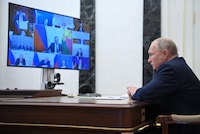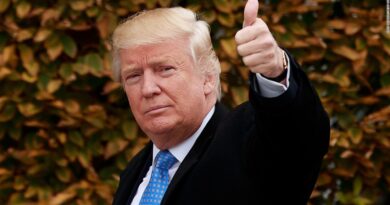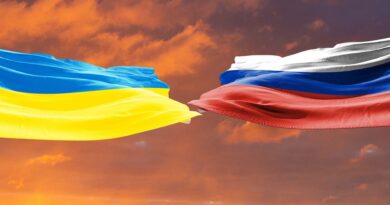Wagner rebellion raises doubts about stability of Russia’s nuclear arsenal

The rebellion in Russia by Wagner mercenaries confronted Western officials with one of their gravest fears: the possibility of political chaos and instability in the country with the world’s largest nuclear arsenal.
Anxiety over who might gain control of Russia’s weapons of mass destruction has long tempered Western hopes that President Vladimir Putin might be ousted from power. But months of nuclear posturing by Putin and other senior Russian officials, and a new debate among Moscow analysts on using a nuclear weapon on a NATO country, have raised doubts about whether Putin really provides the stability necessary to avoid an atomic Armageddon — or if he is the risk they should fear most.
Russian officials have played on the West’s nuclear fears throughout the war in an effort to undermine Western support for Ukraine and to slow weapons deliveries, a tactic that seems to have worked.
And in recent weeks the drumbeat has intensified, with some well-connected Russian strategic analysts and think tank experts openly proclaiming the “necessity” for Moscow to carry out a preemptive tactical nuclear strike on a NATO country, like Poland — to avoid defeat in the war on Ukraine and to revive Western terror of Russia’s nuclear might.
Since the Wagner rebellion, Sergei Karaganov, a former Kremlin adviser and influential Russian political scientist, has doubled down on calls for Moscow to do so. In an earlier article last month headlined, “A Difficult but Necessary Decision,” Karaganov argued the risk of a retaliatory nuclear strike on Russia, and nuclear Armageddon, “can be reduced to an absolute minimum.”
No sane American president would put the United States at risk by “sacrificing conditional Boston for conditional Poznań,” he wrote, referring to a city in Poland.
Hawkish Moscow-based military analyst, Dmitry Trenin, supported Karaganov, arguing that “an unambiguous — and no longer verbal — signal should be sent” to Washington.
“The possibility of using nuclear weapons in the current conflict should not be hidden,” he wrote in an essay, calling for the revision of Russia’s nuclear doctrine, which limits the use of nuclear weapons to cases where Russia’s existence is threatened. Both essays were published by influential Russian foreign policy think tank, the Foreign Policy Research Foundation.
Trenin lamented that Russia’s deployment of nuclear weapons in Belarus — which Putin says will be completed by year end — had caused no visible alarm in Western capitals.
Karaganov’s essays have a messianic tone that reflect Putin’s zealous view of his place in history, solving what Moscow likes to call “the Ukraine problem,” a reference to an independent, democratic nation choosing a pro-Europe path on Russian borders.
He argues nuclear weapons were invented by God to revive mankind’s fear of Armageddon, insisting, “That fear needs to be revived.” He sees Russia as “chosen by history” to destroy the “Western yoke,” and “finally free the world.”
Many Russian nuclear arms experts gasped in horror at the calls from Karaganov and Trenin. One, Ivan Timofeev, called it “extremely dangerous.”
Three experts writing in Kommersant newspaper, Alexei Arbatov, Konstantin Bogdanov and Dmitry Stefanovich, experts from the Center for International Security, called the idea that Washington would not strike back, “highly doubtful and likely erroneous.”
Then came the specter of civil war, with Wagner mercenaries rolling in a convoy toward Moscow in the most serious political chaos since 1993 when President Boris Yeltsin ordered tanks to fire on the country’s parliament to squash a rebellion by lawmakers.
As the Wagner rebellion unfolded earlier this month, United States officials contacted Moscow to assure Putin that Prigozhin’s rebellion was an internal Russian matter, according to National Security Council spokesman John Kirby. That reassurance highlighted the worry among Western leaders that Putin, sensing a Western plot or fearing defeat, could take radical action.
The rebellion is over, but any drastic new shocks in the war could trigger instability in Russia. A major new defeat in the war could topple Putin, said Anatol Lieven, of the Quincy Institute for Responsible Statecraft, or it could see him escalate and resort to a tactical nuclear weapon.
If Putin faced the loss of occupied Crimea, “the chances of escalation would be extraordinarily high because he would believe it was necessary to save Crimea, but it would also be necessary to save his regime at that point,” Lieven said.
Analysts predict a major internal crackdown in Russia, to prevent any similar rebellion by any armed rogue group in future.
After seizing a military headquarters in Rostov-on-Don, Wagner fighters moved north to the city of Voronezh raising alarm about the Voronezh-45 nuclear weapons storage facility located about 130 miles further east. But even if Wagner had targeted the weapons — and there is no evidence it did — the mercenaries would not have been able to use them, analysts said.
“Can an armed group like Wagner take control of some of Russia’s nuclear weapons and somehow use or detonate them? The short answer is no, it’s virtually impossible,” tweeted Pavel Podvig, nuclear arms expert at the U.N. Institute for Disarmament Research, after a blue-checked Twitter conspiracy theorist spread disinformation to more than 250,000 Twitter followers that Wagner leader Yevgeniy Prigozhin had “got the nukes.”
At last month’s St. Petersburg economic forum, Putin said nuclear weapons would protect Russian security “in the broadest sense of the word,” but that there was “no need” to use them at present.
Pressed at the plenary session on whether he would be willing to use them, Putin joked, “What should I say? Scare the whole world? Why do we need to scare the whole world?”
But since the invasion of Ukraine Putin and top officials including deputy head of Russia’s Security Council Dmitry Medvedev and Foreign Minister Sergei Lavrov have led the nuclear fearmongering. Announcing the invasion on day one, Putin warned that any country that interfered in the war would face consequences “such as you have never seen in your entire history,” in an unambiguous hint about nuclear weapons.
Days later, he put Russian nuclear weapons into “special combat readiness.” Since then Russia has suspended participation in the New START accord and announced that nuclear weapons would be stored in Belarus. In September, Putin explicitly warned that Russia would use nuclear weapons if its territory was threatened, as he claimed to annex four Ukrainian regions.
In the latest nuclear warning, Medvedev said a nuclear apocalypse was “not just possible but quite probable” in an article in Rossiyskaya Gazeta on Sunday, because “there is no taboo” on using nuclear weapons. Medvedev claimed that the West had to accept the annihilation of Ukraine’s “Nazi” government — “if it does not want an apocalyptic end” to civilization.
Some analysts saw the debate on nuking a NATO country as an orchestrated bluff to escalate Western nuclear fears, but others saw it merely as hard-liners venting about Russia’s failings in the war.
“It’s fair to say that people in that community feel frustration about the situation, and my take is that they are thinking out loud,” Podvig said in an interview. He said that Russian officials had been “pretty consistent, that nuclear weapons could only be used to protect Russia from some kind of existential threat.”
“The weapons are there, and there are scenarios in which they can be used. However, we are, at least at this point, two steps away from this point.” If Russia began to seriously consider using nuclear weapons in Ukraine or Poland, there would first be a much sharper switch in Kremlin rhetoric, he said.
But a worrying question is what would comprise an “existential threat” to Russia in Putin’s mind, given his profound conviction that he is the state’s sole guardian and protector.
In January, the Bulletin of the Atomic Scientists moved the hands of the Doomsday Clock forward by 10 seconds to 90 seconds to midnight, largely “because of the mounting dangers of the war in Ukraine,” it said.
Artur Kacprzyk, analyst on nuclear arms at the Polish Institute of International Affairs, said the Moscow debate on striking Poland was a form of nuclear coercion designed to intimidate NATO, and it caused “concern but definitely not panic.”
“The level of this debate in Russia, and its intensity, about potential nuclear use is higher than before,” he said. “If they believe that the West will fold, that will encourage them to just increase and increase these threats.”
Days before the Wagner rebellion, President Biden said the risk of Russia using a tactical nuclear weapon against Europe was “real,” Reuters reported.
But Kirby said last week that the United States had seen “no indication that Mr. Putin is interested in moving in that direction and nor have we seen anything that would cause us to change our own deterrent posture.”
Pro-Kremlin analysts like to argue that a nuclear power “cannot lose” the war, despite a history of bogged down military misadventures by Moscow and Washington.
According to Podvig, a source of frustration for Russia was that possessing nuclear weapons was simply not a decisive factor to win the war.
“It’s not that someone does not respect Russia’s nuclear weapons,” Podvig said. “It’s that you cannot really think of a way of using them to gain any advantage. At this point, I guess the only thing that Russia gets out of its nuclear weapons is that there is no direct involvement of NATO or the United States in this war.”
This article has been archived for your research. The original version from The Washington Post can be found here.


